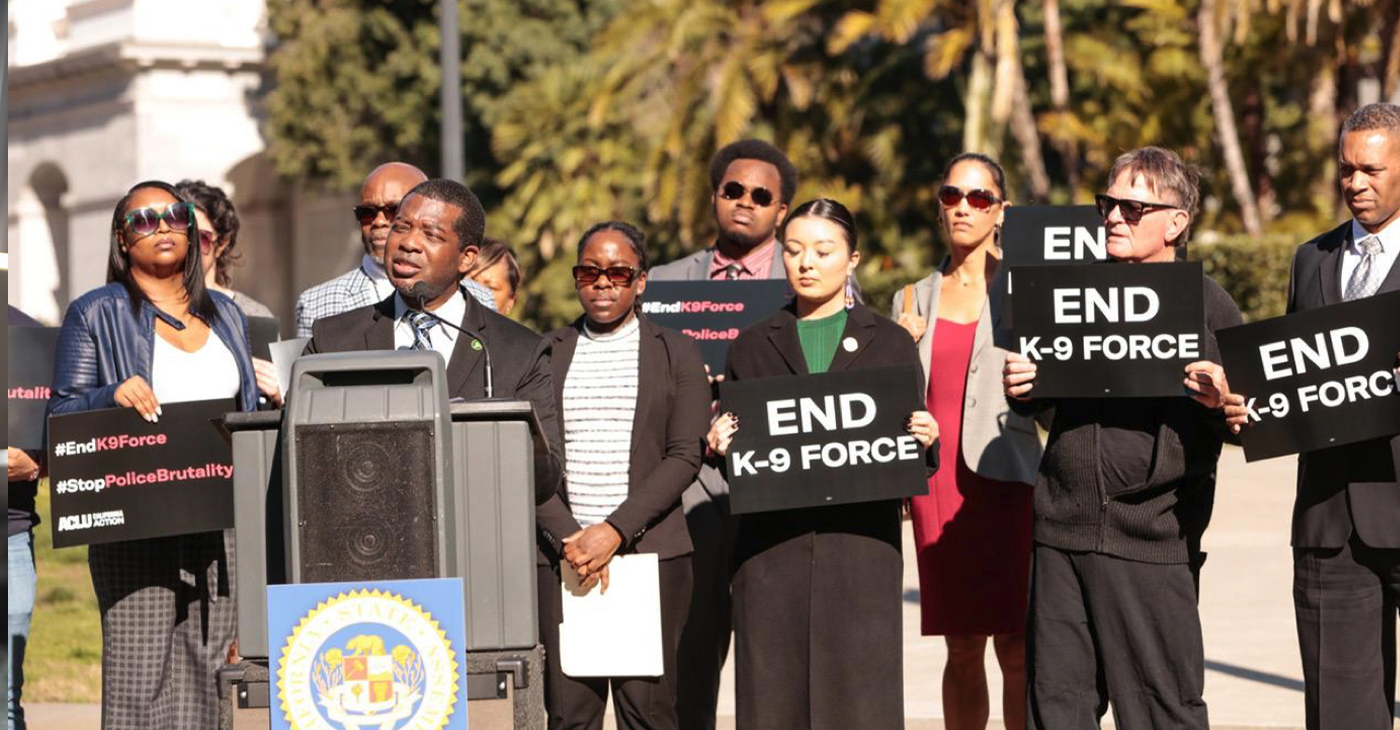California Black Media
New Assembly Bill Would Ban Use of Police Canines for Arrests, Crowd Control
Last week, Assemblymember Corey A. Jackson (D-Riverside) introduced Assembly Bill (AB) 742, legislation that would prohibit the use of police canines for arrests, apprehensions and crowd control. The use of police canines, supporters of the legislation say, is a throwback to the darkest days of legal slavery, Jim Crow segregation — and a reminder of America’s history of racial bias, aggression and violence against Blacks and people of color. Jackson says he wants to end the “deeply racialized, traumatic and harmful practice.”

By Edward Henderson
California Black Media
Last week, Assemblymember Corey A. Jackson (D-Riverside) introduced Assembly Bill (AB) 742, legislation that would prohibit the use of police canines for arrests, apprehensions and crowd control.
The use of police canines, supporters of the legislation say, is a throwback to the darkest days of legal slavery, Jim Crow segregation — and a reminder of America’s history of racial bias, aggression and violence against Blacks and people of color. Jackson says he wants to end the “deeply racialized, traumatic and harmful practice.”
“Since their inception, police canines have been used to inflict brutal violence and lifelong trauma on Black Americans and communities of color,” said Jackson at a press conference held to announce the bill. “It’s time to end this cruel and inhumane practice and instead work towards building trust between the police and the communities they serve.”
The American Civil Liberties Union (ACLU) California Action, a co-sponsor of AB 742, echoed Jackson’s concerns. “The use of police canines has severe and potentially deadly consequences for bite victims, especially communities of color,” said Carlos Marquez III, executive director of ACLU California Action. “It’s time for California to take a stand and end this inhumane practice.”
Jackson says his stance on the use of canines in law enforcement is backed up by data. For him, it’s a “moral issue” as well.
“I let the data take me to where I need to go. And the data is clear that in some of the most consequential issues of our time right now — especially when it comes to the relationship between law enforcement and the African American community,” Jackson told California Black Media (CBM). “This was a no-brainer for me. This is not a ‘gotcha’ bill. Our own data in California shows that we have it wrong, and we have to fix it.”
“The fact that canines are harming people more than batons and tasers is astonishing to me. I would never have guessed that,” added Jackson, who says he has already read three reports on the topic.
The California/Hawaii (CA/HI) Conference of the NAACP, another co-sponsor, acknowledges the bill’s historic importance. “Police canines have historical roots in slavery and have continued to be used as tools of oppression for Black, Brown, and other communities of color,” said conference President Rick L. Callender. “With this bill, we can begin to shift and sever ties with the terrorizing past.”
AB 742 does not call for banning the use of police canines for search and rescue, explosives detection, and narcotics detection — all activities that do not involve biting.
“The use of a canine is sending a dog out that will inflict injury on a person before that person has been accused of a crime or formally convicted of one,” said Kat Carell, a member of the Sacramento Chapter of the ACLU. “So, you end up with lifelong disfigurement, or mental problems, or you could be killed before you have ever been in a court of law and proven guilty of anything.”
Reaction to the introduction of the bill by police dog handlers and some law enforcement organizations — including the Western States Canine Association — was swift, charactering the bill as misguided and going too far.
Ron Cloward, president of the Western States Police Canine Association and a veteran of the Modesto Police Department, said Jackson’s bill does not “make sense.” He argued that if AB 742 passes, it would take away one more non-lethal weapon law enforcement relies on to fight crime.
Cloward, who owns a canine training business, told ABC news affiliate in Bakersfield that while dog bites can be harmful and “disfiguring,” they do not cause death. He further asserted that it was the only method of force that can be recalled after deployment.
“Once you’ve deployed pepper spray, it’s been deployed. It’s gonna land. Once you use your gun, it’s gone,” he said. “Once you use a taser, it’s on its way. You’re not stopping it. The only thing you can stop is a K-9.”
Jackson was elected in November of 2022 to represent the 60th Assembly District. Before that, he served on the Riverside County Board of Education in 2020 and represented portions of the cities of Riverside, Moreno Valley, Perris, and the unincorporated community of Mead Valley.
Supporters say Jackson’s background in social work gives him a keen awareness and understanding of the microaggressions Black and Brown communities face.
AB 742 is one of many pieces of legislation Jackson has introduced (or plans to) that holds individuals and institutions accountable, creating room for even larger victories towards dismantling systematic racism. He calls the effort the ‘Antiracism Bill Package.’
Another bill in the package is AB 11. That bill would authorize the creation of a commission to identify sustainable solutions to reduce the cost of living in California.
The commission would consist of 11 members, including nine members appointed by the Governor, the Speaker of the Assembly, and the President pro Tempore of the Senate.
Also, one member each from the Assembly and the Senate would serve as ex officio non-voting members. The bill would require the commission to complete reports describing the commission’s findings and recommendations.
Activism
Oakland Post: Week of April 17 – 23, 2024
The printed Weekly Edition of the Oakland Post: Week of April 17 – 23, 2024

To enlarge your view of this issue, use the slider, magnifying glass icon or full page icon in the lower right corner of the browser window. ![]()
California Black Media
Yahushua’s Law: Senate Advances Bill to Protect Students from Extreme Weather
In a significant move towards student safety, the California Senate Education Committee passed Senate Bill (SB) 1248, also known as Yahushua’s Law, on April 3. The bill is named in memory of Yahushua Robinson, a 12-year-old student from Lake Elsinore, who tragically died due to a heat-related illness during a physical education class in 2023. It is a pioneering effort to prevent similar incidents in the future.

By California Black Media
In a significant move towards student safety, the California Senate Education Committee passed Senate Bill (SB) 1248, also known as Yahushua’s Law, on April 3.
The bill is named in memory of Yahushua Robinson, a 12-year-old student from Lake Elsinore, who tragically died due to a heat-related illness during a physical education class in 2023. It is a pioneering effort to prevent similar incidents in the future.
Authored by Senator Melissa Hurtado (D-Bakersfield) and co-authored by Assemblymember Akilah Weber, M.D. (D-La Mesa), SB 1248 directs the California Department of Education to develop comprehensive guidelines for schools regarding student activity during all extreme weather conditions.
“No student should ever lose their life on campus to extreme weather when we can take steps to protect them by preparing statewide plans to minimize exposure to the most harmful elements of exposure,” Hurtado said after introducing SB 1248.
The bill stipulates that schools must implement safety measures which include monitoring weather forecasts, postponing or relocating outdoor activities during hazardous conditions, and ensuring students have proper hydration and access to shade. It also requires schools to establish clear communication plans to keep parents, teachers, and students informed about potential weather hazards.
Supporters of the bill include the Robinson family, advocate Christina Laster, Bold Enterprises LLC, California Black Women’s Collective Empowerment Institute, Familias Empoderadas del Valle Central National Action Network, The Black Student Advocate, and the Ventura County Alumnae Chapter of Delta Sigma Theta Sorority.
Thanking Hurtado for introducing this crucial legislation, Weber said, “The story of Yahushua Robinson last year was heartbreaking. We have protections for farm workers and other industries in the case of extreme weather, now climate change is forcing us to also extend similar protections to students at school.”
California Black Media
Expert Advice: How to Protect Yourself From Bias and Backlash at Work
As reports of antisemitic and Islamophobic threats and acts of hate and violence increase in California and across the country, the California Commission on the State of Hate (Commission) and California Civil Rights Department (CRD) continue to encourage Californians to take advantage of anti-hate resources available statewide, including the California vs Hate hotline and website. “The Commission on the State of Hate stands united in shared humanity with the people of California in denouncing violence and hate,” said Commission Chair Russell Roybal in a statement.

By Edward Henderson, California Black Media
As reports of antisemitic and Islamophobic threats and acts of hate and violence increase in California and across the country, the California Commission on the State of Hate (Commission) and California Civil Rights Department (CRD) continue to encourage Californians to take advantage of anti-hate resources available statewide, including the California vs Hate hotline and website.
“The Commission on the State of Hate stands united in shared humanity with the people of California in denouncing violence and hate,” said Commission Chair Russell Roybal in a statement.
“We recognize what is happening in the Middle East has devastated communities in California. Unfortunately, when these horrific events occur, instances of hate tend to rise as well. No person, whether they are Jewish, Muslim, Palestinian, Israeli, or perceived as members of any of these groups, should be subject to prejudice or violence,” he added.
“If you experience or witness hate in California, we encourage you to contact CA vs Hate to report the incident and get connected to support and resources.”
Title VII of the Civil Rights Act of 1964 prohibits discrimination in all aspects of employment, including hiring, firing, pay, job assignments, promotions, layoffs, training, fringe benefits, and any other term or condition of employment. This prohibition extends to discrimination based on religion, national origin, and race.
One form is the adverse treatment of an individual based on their actual or perceived religious practices or membership in a particular racial or national origin group.
Another form is adverse treatment based on the assumption that the individual holds certain beliefs because of their religion, national origin, or race. There can also be adverse treatment due to the individual’s actual or perceived association with, or relationship to, a person of a particular religion, national origin, or race.
The UCLA Center for Equity and Inclusion recommends four tactics to respond to workplace bias or hate.
Interrupt Early
Workplace culture largely is determined by what is or isn’t allowed to occur. If people are lax in responding to bigotry, then bigotry prevails.
Use or Establish Policies
Call upon existing policies to address bigoted language or behavior. Work with your personnel director or human resources department to create new policies and procedures, as needed. Also ask your company to provide anti-bias training.
Go Up the Ladder
If behavior persists, take your complaints up the management ladder. Find allies in upper management and call on them to help create and maintain an office environment free of bias and bigotry.
Band Together
Like-minded colleagues also may form an alliance and then ask the colleague or supervisor to change his or her tone or behavior.
CA vs Hate is a non-emergency, multilingual hate crime and incident reporting hotline and online portal. Reports can be made anonymously by calling (833) 866-4283, or 833-8-NO-HATE, Monday to Friday from 9 a.m. to 6 p.m. PT or online at any time. Hate acts can be reported in 15 different languages through the online portal and in over 200 languages when calling the hotline. For individuals who want to report a hate crime to law enforcement immediately or who are in imminent danger, please call 911. For more information on CA vs Hate, please visit CAvsHate.org.
-

 Activism4 weeks ago
Activism4 weeks agoOakland Post: Week of March 20 – 26, 2024
-

 #NNPA BlackPress3 weeks ago
#NNPA BlackPress3 weeks agoCOMMENTARY: D.C. Crime Bill Fails to Address Root Causes of Violence and Incarceration
-

 #NNPA BlackPress3 weeks ago
#NNPA BlackPress3 weeks agoMayor, City Council President React to May 31 Closing of Birmingham-Southern College
-

 #NNPA BlackPress3 weeks ago
#NNPA BlackPress3 weeks agoCOMMENTARY: Lady Day and The Lights!
-

 #NNPA BlackPress3 weeks ago
#NNPA BlackPress3 weeks agoFrom Raids to Revelations: The Dark Turn in Sean ‘Diddy’ Combs’ Saga
-

 #NNPA BlackPress3 weeks ago
#NNPA BlackPress3 weeks agoBaltimore Key Bridge Catastrophe: A City’s Heartbreak and a Nation’s Alarm
-

 Activism3 weeks ago
Activism3 weeks agoOakland Post: Week of March 27 – April 2, 2024
-

 #NNPA BlackPress3 weeks ago
#NNPA BlackPress3 weeks agoBaltimore’s Key Bridge Struck by Ship, Collapses into Water














































